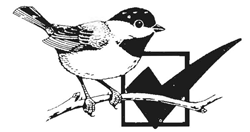 Last year, more than 7,500 Iowa taxpayers helped boost wildlife conservation with donations to the Fish and Wildlife Fund on their state income tax form, a decline of about 400 from 2016. Donators represent about 0.4 percent of total tax payers in Iowa.
Last year, more than 7,500 Iowa taxpayers helped boost wildlife conservation with donations to the Fish and Wildlife Fund on their state income tax form, a decline of about 400 from 2016. Donators represent about 0.4 percent of total tax payers in Iowa.
“We are so thankful to all the people who choose to donate to wildlife conservation with their tax refunds,” said Stephanie Shepherd, wildlife biologist with the Iowa Department of Natural Resources Wildlife Diversity Program. “These donations go directly to habitat development and restoration programs for some of Iowa’s most vulnerable animal species. The funds are so important for natural resources.”
The Fish and Wildlife Fund, known popularly as the “Chickadee Check-off,” is a mechanism the Iowa Legislature created in the 1980s for Iowa citizens to donate to wildlife conservation on the Iowa state tax form. Prior to the creation of the Fish and Wildlife Fund, “non-game” wildlife had no dedicated funding.
Proceeds from the check-off are one of the few means of support for the Department of Natural Resources’ Wildlife Diversity Program, responsible for protecting more than 1,000 fish and wildlife species in the state. Money from the check-off helps improve wildlife habit, restore native wildlife, provide opportunities for citizens to learn about our natural resources and much more.
Iowans donated roughly $145,000 last spring when completing their 2017 tax forms, translating to an average gift of $19.25 per donor. The number of donors has remained steady or decreased but thanks to more generous giving, the amount donated has also stayed level or even increased.
“The Chickadee Check-off is an inconspicuous line that is easy to pass over or forget, and many tax preparers may not remember to ask whether a client wants to donate,” she said. “It may be up to the taxpayer to remind their preparer, or make a point of looking for it whether they are doing their form on paper or electronically.”
According to Shepherd, donating on the tax form is easy: simply write the amount to donate next to the Fish and Wildlife Check-Off, line 57 on Form 1040, and the sum is either automatically deducted from the refund or added to the amount owed. As with all charitable contributions, the amount is deductible from next year’s taxes.
“If every Iowa taxpayer donated just $1, it would mean $1.5 million for wildlife and natural resource conservation,” said Shepherd.
